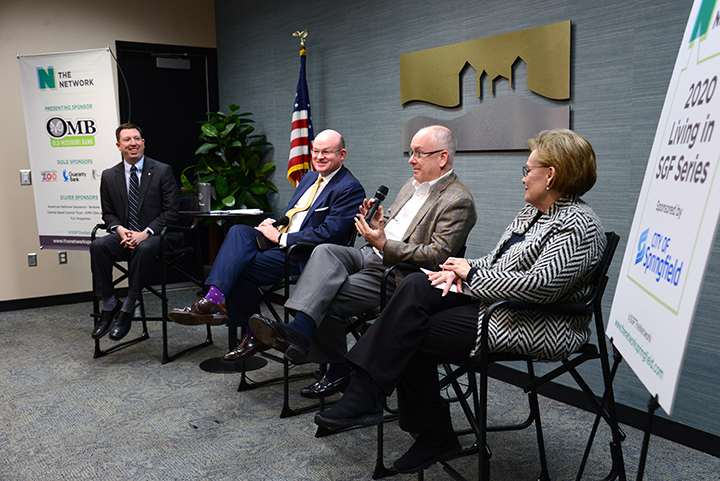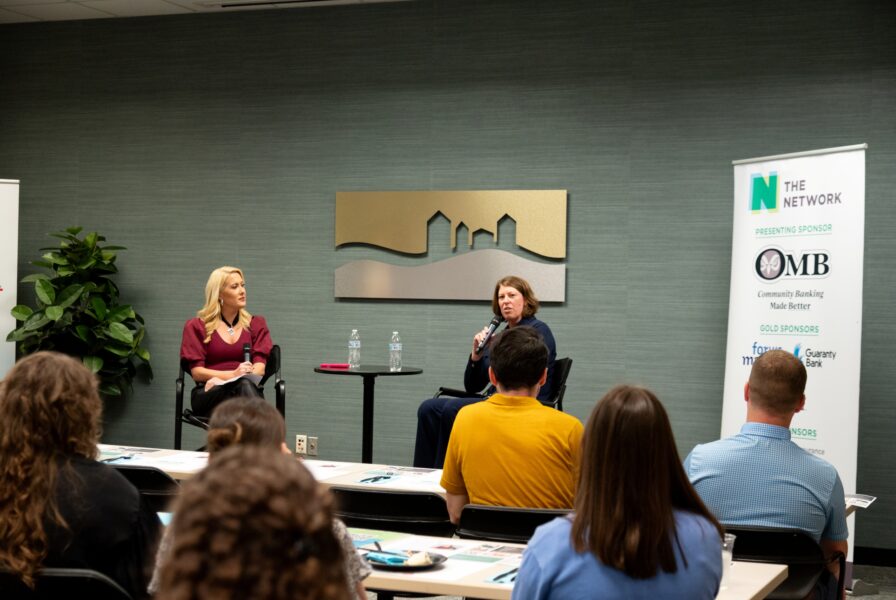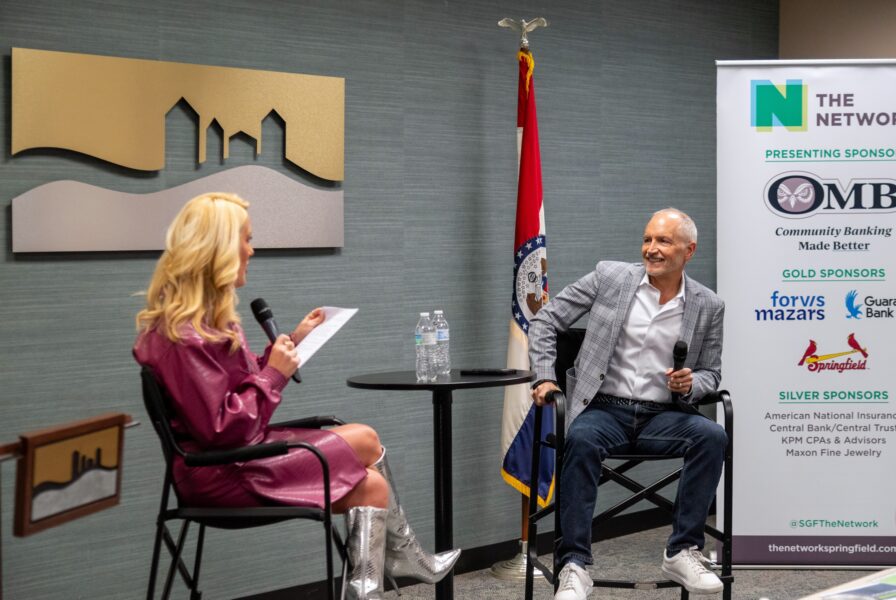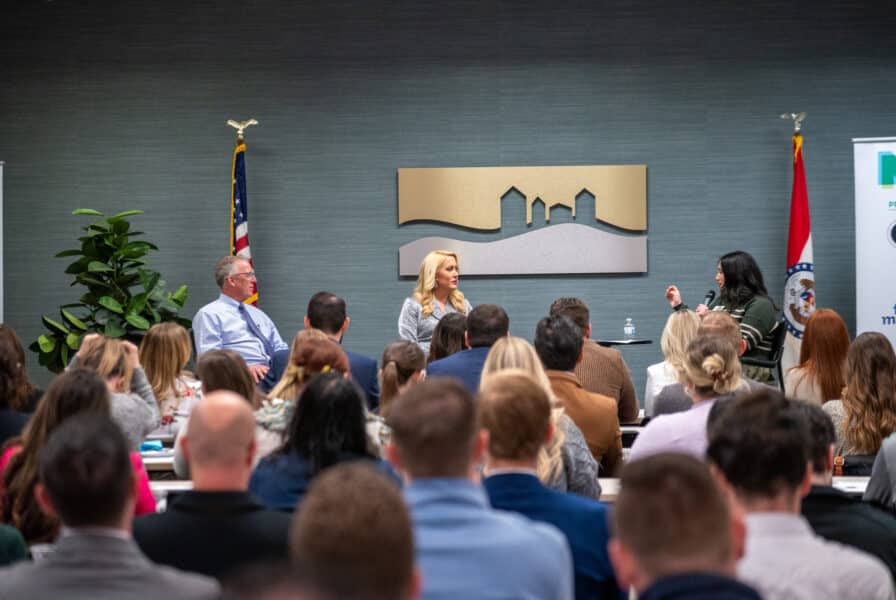When you think of the industries that have the biggest impact on the Springfield area, what comes to mind? Health care? Manufacturing? Retail?
One of the sectors with the biggest impact is higher education. There are more than 46,000 students in Springfield metro area higher ed institutions, from Missouri State University, Drury and Evangel to Ozarks Technical Community College, Cox College of Nursing & Health Sciences and Southwest Baptist University in Bolivar. Those schools contribute millions of dollars to the local and regional economy each day.
Three local leaders in the higher education sector sat down with Network Chair Ryan Sivill on January 23 to talk about what their organizations and higher ed overall mean to Springfield, and why it’s important for Springfield to continue to stay connected to the college scene.
OTC Chancellor Dr. Hal Higdon, Missouri State University President Clif Smart and Evangel University President Dr. Carol Taylor spoke to more than 100 YPs on a variety of topics, including what they enjoy most about their jobs, misconceptions about their schools and the industry, and how YPs can support higher ed. Here’s some of what they had to say.What do you love most about your job?
Smart: I think all of us divide our jobs into internal – budget, crisis management, planning – and the external – friend raising, fund raising, advocacy in Jefferson City and Washington D.C., community engagement. I think I’m better at the external. My goal has always been to hire a great team, agree on our short-term and long-term goals, and that frees me to focus most of my time on the external stuff.
Higdon: When I look at other community colleges, I see we’re doing really well at developing talent – both our students and our staff. If I hire really good people, I work less and I don’t worry as much. My background is HR, so I enjoy watching people grow … and sometimes watching them grow and leave. I think that’s the ultimate compliment.
Taylor: Working with the young men and women, whether they’re new students full of passion and ideas or someone coming back to advance their careers. The thing I collect that I love most is stories – why they come here, why they support the school. I love all of those.What impact does your school have on the community?
Higdon: We serve all people. We challenged our staff to throw out standardized testing and went with personalized testing, and now we’re one of five schools in the state with a 10% increase in graduation rates. Standardized tests do more harm than a bad teacher.
Smart: We’re a $380 million organization. That’s more than $1 million a day that the university plugs in to the economy, without looking at what our 3,500 employees and 26,000 students are spending. The big public institution is an important part of the city.
Taylor: One of our core values is service, and the way we introduce students to college is that when they move into the school, we bus them around with Convoy of Hope and they spend half a day doing volunteer work – we estimate 45,000 hours of volunteer work a year.
Common misconceptions about your school or college in general?
Taylor: People think that if you want to do something important you have to go to an Ivy League school. The quality of education that you get is not based on the name on your school. The Great Jobs, Great Lives study interviewed 30,000 people about what made them successful and led to a great life. The #1 finding: it doesn’t matter where you go to school. It matters how you do it. Did they have at least one professor who knew them by name, inspired them to learn, pursue their dream and not give up? The #2 finding: Did you have an opportunity to take what you learned outside of the classroom?
Smart: One of the misconceptions about us, still, is that we’re still SMS. People don’t know we’ve grown 20 of the last 23 years, that we graduate close to 5,000 students a year. We’ve worked hard to raise our profile such that people talk about Mizzou and MSU in the same sentence.
Higdon: Community colleges are often considered lesser than, especially among older people. A community college is still a college. We still have to get past the idea that “you don’t need to go to college; you can just go to a community college.”
How can YPs support colleges?
Higdon: we are a higher education town. The average person in Springfield will not tell you we’re a college town, but we’re a college town. So go vote. And talk to your state legislators. You need to hold your elected representative responsible for funding higher education.
Smart: Also, be engaged with your alma mater. If you’re an MSU grad, go to a basketball game. Or tailgate a football game. Talk us up. Put a sticker on the back of your car. Be proud of where you went to school. We offer volunteer opportunities and ways to connect.
Taylor: And here’s another way you can give back. This year, EU will give $19M in scholarships. A lot of that came from friends and alumni who wanted to give back and give another student the chance to go to school. When the alumni office contacts you and asks you to give, think about the opportunity to help another student. Also, if you had the chance to do an internship or job shadow, give someone else that opportunity – mentor a student and give them that chance.



